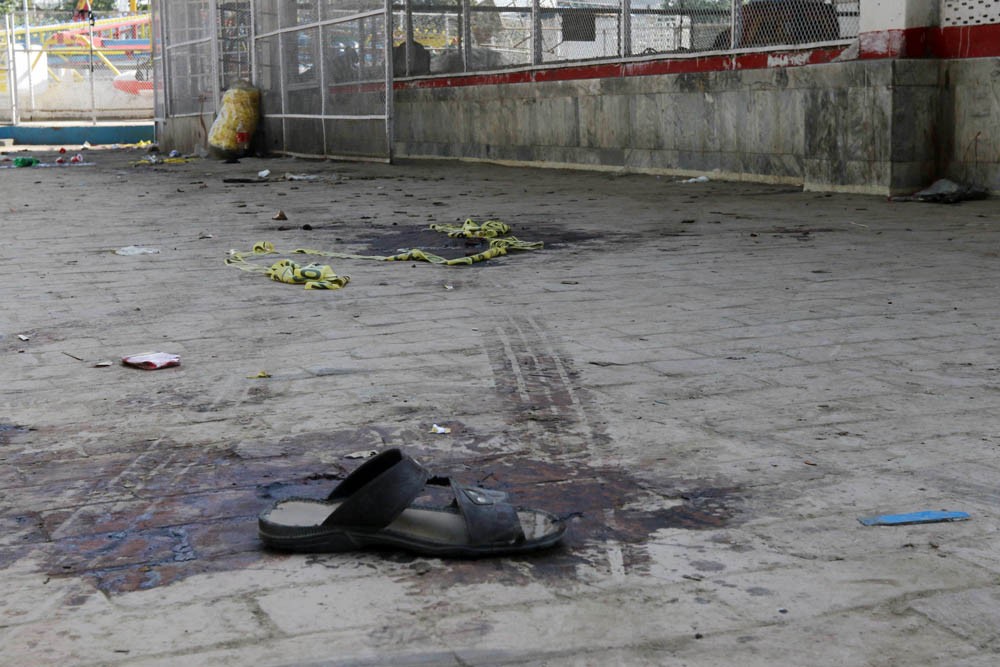
The military and the Punjab government are both making claims of new intelligence based search operations and arrests following last Sunday’s suicide blast in Gulshan-i-Iqbal Park. But is that enough?

Allah Rakha, a labourer in a factory, was enjoying the weekend on a spring evening with his two other friends at Gulshan-i-Iqbal Park when he suddenly heard a blast. He later came to know that a suicide bomber had hit the swings and joyrides area of this huge recreational facility.
"We were walking in the park near the swings when there was a blast around evening prayers. I and my friends fell down. The electricity went off. There was complete dark and we could hear cries of women and children everywhere," Allah Rakha tells TNS lying on a bed in Lahore’s Jinnah Hospital with a fractured right leg. He came to senses a few moments after the blast to discover that one of his friends had lost his life.
The hospital emergency wards were packed after this huge blast that killed at least 74 people including 30 children and many women. There are more children among the 300 injured as the bomber had targeted the children’s side of the park.
Despite many requests, a final list of the injured and dead people in this blast is not yet prepared and shared with the media.
Lahore has been hit by a terrorist attack after quite some time. The hiatus was long enough for people to assume that Punjab or at least Lahore was safe. The Gulshan-i-Iqbal Park attack -- the first in 2016 -- has shaken the confidence of both the government and the people. The last attack in Lahore happened in March 2015 when two suicide bombers simultaneously targeted two churches in a predominantly Christian population, Youhanabad, during the Sunday Service, killing at least 15 and injuring scores.
Following the attack, both the military and the Punjab government are issuing different lists of search operations and number of arrests to show their commitment against terrorism. There are claims of initiating intelligence-based operations to destroy the sleeper cells and facilitators of terrorist groups. Instead of sharing exact figures of this attack or the security lapses, there are more claims about search operations, showing a new resolve to implement the National Action Plan.
Towards the end of 2015, the Punjab government had claimed taking "vigorous action" under the National Action Plan in the form of the newly-promulgated laws in Punjab, under which a total number of 48,617 cases had been registered, while 53,151 accused had been arrested, for various offences including hate speech, wall chalking, display of arms and other offences under the newly promulgated laws. The government had also claimed killing of 88 hardcore terrorists in police encounters in 2015 and 29 such criminals by the end of March 2016.
"The recent attack has proved the existence and reach of terrorist groups through their facilitators and sympathisers. It has exposed the tall claims of the Punjab government," says political analyst Hasan Askari Rizvi. "The autonomous operations started by security forces in the Punjab province might be exaggerated but will have an impact on these groups."
He says this strategy of intelligence-based operations against terrorist groups in the Punjab should be one of the many steps and there is need to take some political steps too. "We need a multi-pronged strategy to curb terrorism. The initiation of separate military and paramilitary operations is beginning of a new trend in Punjab where the army and Rangers are conducting operations mostly autonomously of civil administration. The impact of this strategy, if it continues on a regular basis, will determine the ultimate fate of counter terrorism in Punjab."
In Iqbal Town alone, this is the third major attack in the past few years. Earlier, during 2009-2011, there were sever attacks at a police station on Independence Day and at a big commercial centre, Moon Market, near this park killing more than 115 people.
"To me, it seems that all agencies, organisations and governments are passing the buck. Such reactions after major attacks are about point scoring and less serious work. We are not opting the right way to eliminate terrorism," says Shaukat Javed, former Punjab IGP.
He says there are no hideouts of terrorists in Punjab but there is need for coordinated intelligence-based operations on a regular basis to hit the support groups of these militants. "But we cannot stop terrorism through such operations only. We need seminary reforms, tribal area reforms and we need to stop terror links and terror financing."
He says that without proper strategies, clear intention and overhauling criminal justice system, we cannot move ahead.
An official statement of Punjab police claimed on March 30: "In the wake of Lahore’s latest blast, search operations are being carried out across Punjab. All field officers are performing their duties and during the last 24 hours (two days after the blast) in all districts, Punjab police have conducted 104 operations, while Counterterrorism Department has conducted 16 raids, and intelligence agencies have conducted 58 intelligence based operations. During these search operations 7618 persons were questioned and 7428 have been released after questioning police detained 195 persons for further enquiry where as five suspects have been killed during an encounter with Crime Investigation Agency (CIA)."
These rapid operations have been launched immediately after the recent attack while the culprits of previous attack on two churches in 2015 are still to be brought to the court of justice. It has been more than a year and the case of last church attacks is still pending before the Anti Terrorism Court in Lahore.
As for the people, they don’t have much faith in any such operation until they feel protected. "Our rulers are protected but unfortunately we aren’t. We and our children are at the mercy of God and no one cares for us," says Maryam Bibi, another injured woman at the Jinnah Hospital.